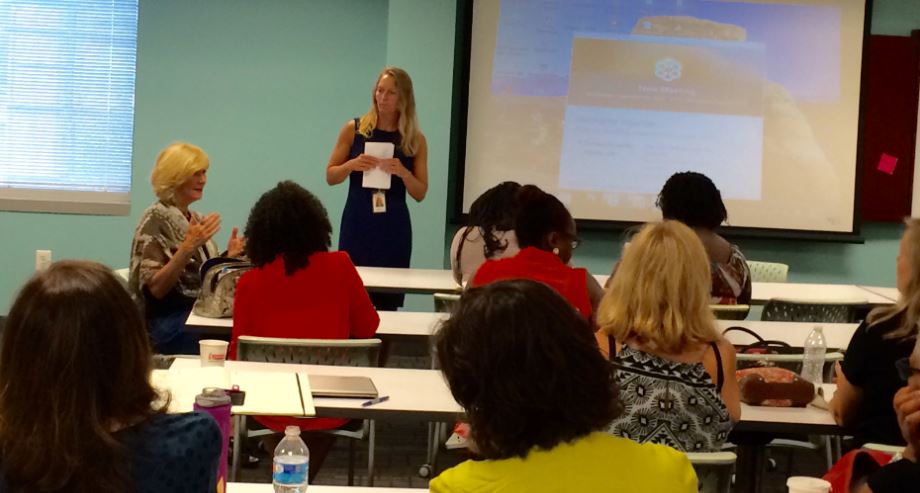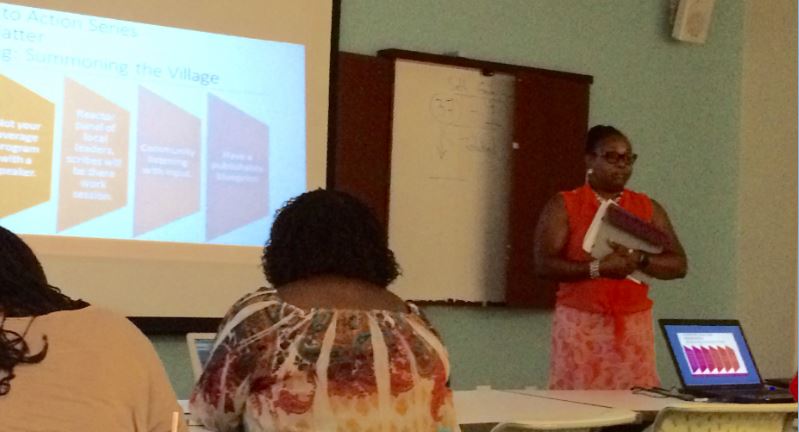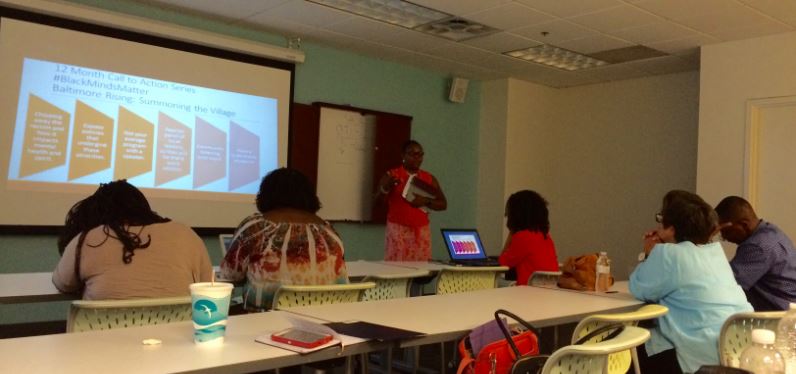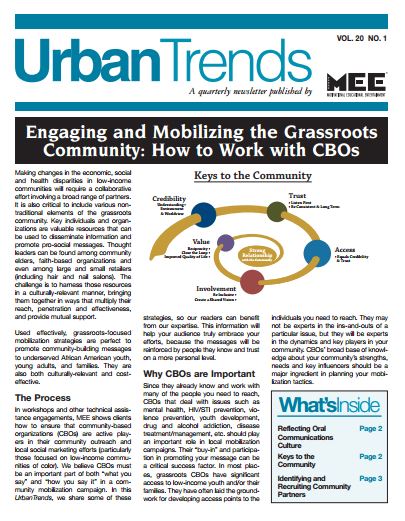At the September 9, 2015 meeting, the Thriving Communities Collaborative focused on healing and community outreach. Speakers included Lynn Mumma, Director of Family Resources at Behavioral Health System Baltimore (BHSB); Jan Desper Peters, Executive Director, Black Mental Health Alliance (BMHA); Alanna Taylor , Member, BMHA; and via webcast, Ivan Juzang, President of MEE Productions.

Lynn Mumma reviewed the steps taken by Baltimore City in the wake of the Baltimore Uprising as well as the City’s plans to become more trauma informed.
Shortly after the Baltimore riots, BHSB partnered with the Baltimore City Health Department (BCHD) and the Mayor’s Office on Criminal Justice to offer healing circles across the city. Professionals who were trained in trauma-informed practices facilitated 30 circles with community members, using a variety of approaches that combined traditional talking with the opportunity for participants to express themselves via other creative mediums including dancing, singing, drumming and mural arts as tools for expression.
Some of the findings Lynn shared based on this initial work included things that are very consistent with topics we’ve discussed in the collaborative around community engagement. Lynn acknowledged that they may not be surprises but are things we certainly have to keep in mind and address as we move forward:
- The youth voice is much stronger when there aren’t as many adults around. If we want to be effective in reaching youth, we have to keep this in mind.
- Safety is paramount – people need safe places.
- Recreational space for youth is needed.
- Of course jobs are critical.
- Youth have distanced themselves from the media messages as they inaccurately portray them, for example, the “thug” messaging.
- Youth are very responsive to learning about the brain science of trauma.
- Sexual abuse is very pervasive.
- There is a need for community led forums.
Notably, the Mayor has committed to Baltimore becoming trauma-informed, and the BCHD is leading the initiative. In partnership with the National Center for Trauma Informed Care, 10 introductory trauma trainings were offered this summer to City employees, professionals and residents. Participants included city agency employees, police officers, therapist, and others.
The next phase of work will focus on implementation of trauma-informed practices and policies, and linking efforts across the City to utilize a collective impact approach to move the work forward. This will include “train the trainer” initiatives and will utilize “policy & practice” teams for implementation. These efforts are working in parallel with others in the city such as the Breakthrough Collaborative and are focused on opening up systems, opening up dialogue, and problem solving at the community level.

Following Lynn’s presentation Jan Desper Peters and Alana Taylor reviewed some of the BMHAs initiatives directed at community outreach and healing. Jan’s presentation is attached. She reviewed the history, mission and current activities of the BMHA in the community, while Alana focused on her work and experience with Emotional Emancipation Circles.
Jan laid out the plan for the BMHA’s 12 Month Call to Action (CTA) series: #BlackMindsMatter – Baltimore Rising: Summoning the Village. Through this series the group is focused on chipping away at racism and how it impacts the mental health and spirit of the community. They aren’t looking to implement your “average program with a speaker”, but rather are bringing nationally recognized thought leaders together with a panel of local leaders and scribes as well as community members for listening as well as input. The ultimate goal is to develop a blueprint for communities. Notably, this initiative has employed a diverse advisory panel that includes young people and community members as well as professionals. Speakers have included Dr. Mindy Thompson Fullilove, author of Urban Alchemy; Dr. Camara Jones of the CDC; and Dr. Lisa Delpit, educationalist and author.
Every month the BMHA walks the community to get a sense of the pulse and mood of community members. They ask questions of people they encounter on the street like: “What’s your mood been?” These community walks lay the groundwork for ensuring any programming is “connected” to the community.
Jan introduced the concept of Emotional Emancipation Circles (EECs) to the TCC audience while Alanna really brought to life the impact this technique can have on individuals and communities.
Emotional emancipation circles were developed by leaders of the Community Healing Network, Inc. (CHN) and the Association of Black Psychologists to heal black people from the psychological and emotional chains of centuries of racism. The EEC is a support group, organized by community leaders, in which black people from all walks of life participate in weekly or bi-weekly group meeting, over a period of time. In these gathering, information is presented to help participants understand the reality and impact of racism, racial micro-aggression, racial stress, psychological trauma and historical trauma. The reality is black people are subject to the lies of black inferiority just as others are. Therefore it’s critical that they substitute this lie with the truth about black humanity. The CHN does a great job of explaining what ECCs are and how they work.
The BMHA has already trained 30 people on how to conduct EECs led by Dr. Cheryl Tawede Grills and there is currently a group in place that meets weekly.
Finally, we heard from Ivan Juzang. He walked the group through the webinar he has developed around community engagement. The key points of this webinar are summarized in an Urban Trends Newsletter published by MEE Productions, Engaging and Mobilizing the Grassroots Community: How to Work with CBO’s. Ivan has presented to the group before, and many of the themes are echoed in the publication.
- The need to establish credibility and trust in order to gain access and involvement of community members. This is essential to creating real value.
- The importance of the oral tradition/word-of-mouth, in being effective in any campaign.
As we progress along the “Road to Resilience”, let’s leverage emancipation circles and community engagement as tools along the way.


